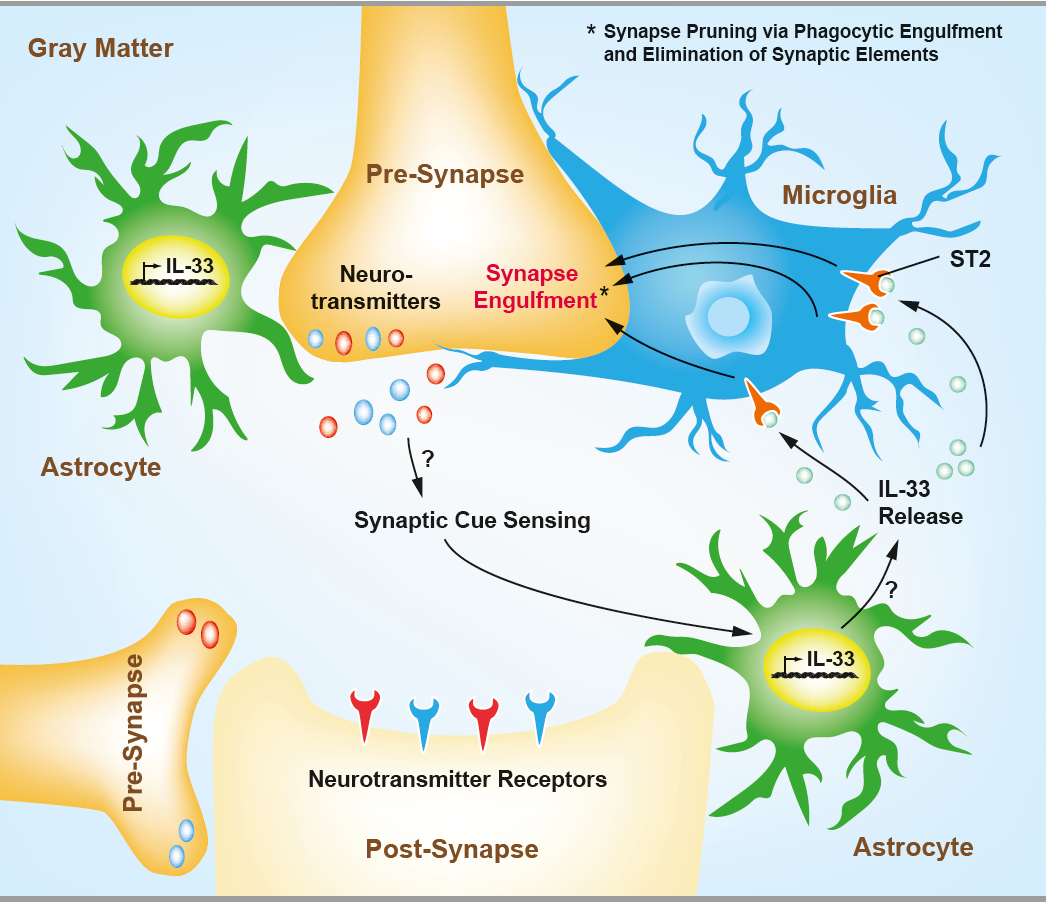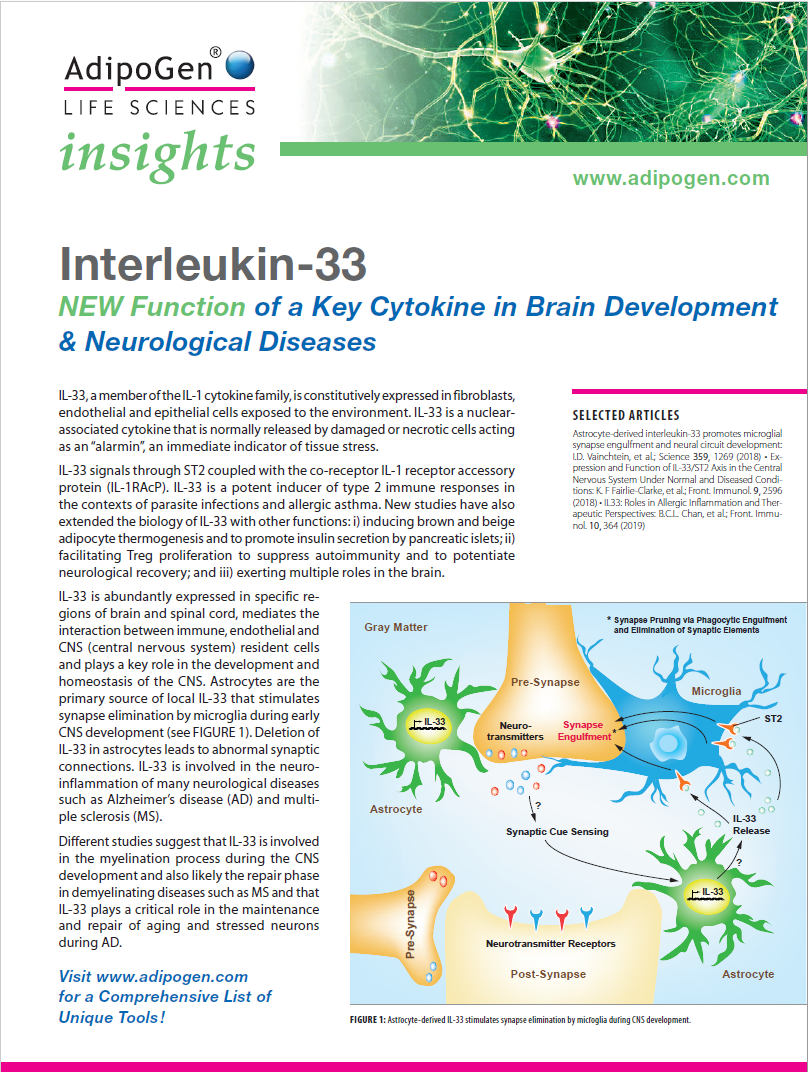Cookie Policy: This site uses cookies to improve your experience. You can find out more about our use of cookies in our Privacy Policy. By continuing to browse this site you agree to our use of cookies.
Interleukin-33 (IL-33) - A Potent Activator of Type 2 Immune Responses
IL-33, a member of the IL-1 cytokine family, is constitutively expressed in fibroblasts, endothelial and epithelial cells exposed to the environment. IL-33 is a nuclear-associated cytokine that is normally released by damaged or necrotic cells acting as an “alarmin”, an immediate indicator of tissue stress. IL-33 signals through ST2 coupled with the co-receptor IL-1 receptor accessory protein (IL-1RAcP). IL-33 is a potent inducer of type 2 immune responses in the contexts of parasite infections and allergic asthma.
New studies have also extended the biology of IL-33 with other functions:
i) Inducing brown and beige adipocyte thermogenesis and to promote insulin secretion by pancreatic islets;
ii) Facilitating Treg proliferation to suppress autoimmunity and to potentiate neurological recovery; and
iii) Exerting multiple roles in the brain.
IL-33 is abundantly expressed in specific regions of brain and spinal cord, mediates the interaction between immune, endothelial and CNS (central nervous system) resident cells and plays a key role in the development and homeostasis of the CNS. Astrocytes are the primary source of local IL-33 that stimulates synapse elimination by microglia during early CNS development (see FIGURE 1). Deletion of IL-33 in astrocytes leads to abnormal synaptic connections. IL-33 is involved in the neuroinflammation of many neurological diseases such as Alzheimer’s disease (AD) and multiple sclerosis (MS).
Different studies suggest that IL-33 is involved in the myelination process during the CNS development and also likely the repair phase in demyelinating diseases such as MS and that IL-33 plays a critical role in the maintenance and repair of aging and stressed neurons during AD.
FIGURE: Astrocyte-derived IL-33 stimulates synapse elimination by microglia during CNS development.
AdipoGen Life Sciences offers a broad range of unique and potent IL-33 research tools:
- Biologically Active Oxidation-Resistant Proteins
- HpARIs (Alarmin Release Inhibitors)
- Potent ST-2 Specific Antibody for Flow Cytometry
Literature References:
-
Astrocyte-derived interleukin-33 promotes microglial synapse engulfment and neural circuit development: I.D. Vainchtein, et al.; Science 359, 1269 (2018)
-
Expression and Function of IL-33/ST2 Axis in the Central Nervous System Under Normal and Diseased Conditions: K. F Fairlie-Clarke, et al.; Front. Immunol. 9, 2596 (2018)
-
IL33: Roles in Allergic Inflammation and Therapeutic Perspectives: B.C.L. Chan, et al.; Front. Immunol. 10, 364 (2019)
Most Comprehensive & Unique IL-33 Reagents for Type 2 Immune Response Research
UNIQUE IL-33 Blocking Antibody
The IL-33 (mouse), mAb (rec.) (blocking) (Bondy-1-1) (Prod. No. AG-27B-0013) is a recombinant antibody developed and produced in-house at AdipoGen Life Sciences. It is produced without the use of animals and purified from HEK 293 cell culture supernatant. This unique antibody has functional activities and inhibits the binding of mouse IL-33 to ST2/IL-1RAcP.
|
Figure: Binding of IL-33 (mouse) to ST2/IL-1RAcP is inhibited by IL-33 (mouse), mAb (rec.) (blocking) (Bondy-1-1) (preservative free) (AG-27B-0013PF). Methods: IL-33 (mouse) was coated on an ELISA plate at 1μg/ml. IL-33 (mouse), mAb (rec.) (blocking) (Bondy-1-1) (preservative free) (AG-27B-0013PF) or an unrelated mAb (recombinant) (Control) were added (starting at 40μg/ml with a twofold serial dilution) together with 100μl of supernatant of cells containing ST2 (human):Fc/IL-1RAcP (human):Fc. After incubation for 1h at RT, the binding was detected using an anti-Fc human antibody (HRP). |
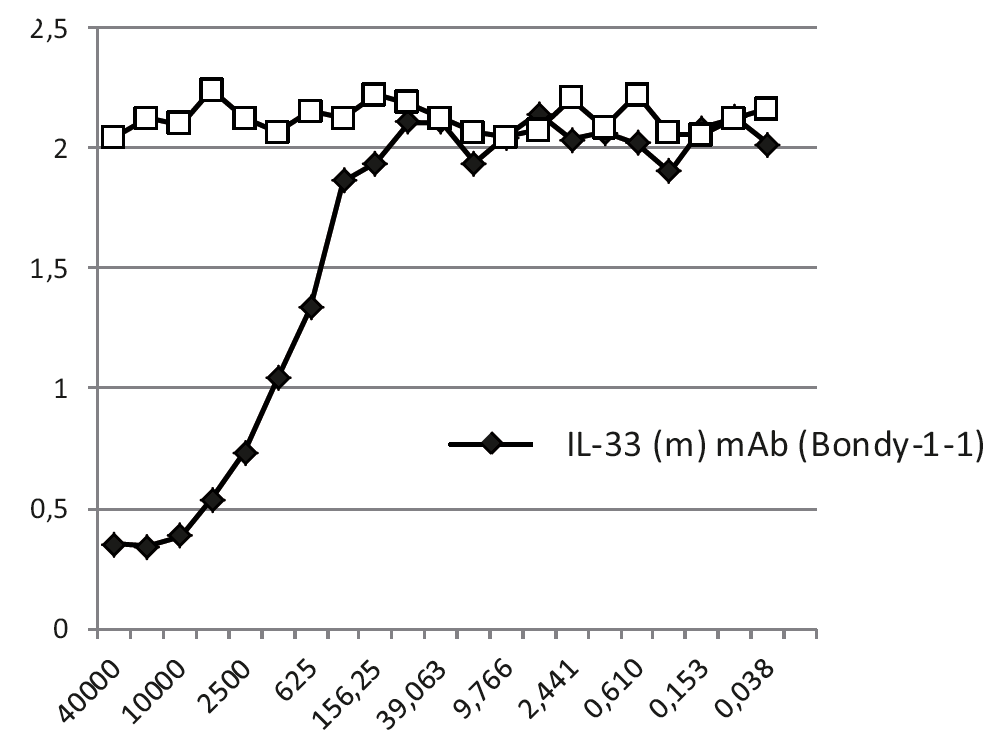 |
Highly Active Human IL-33 Proteins - Oxidation Resistant
IL-33 (oxidation resistant) (human) (rec.) (untagged) (Prod. No. AG-40B-0160) and IL-33 (oxidation resistant) (human) (rec.) (His) (Prod. No. AG-40B-0167) are both specifically designed proteins. The biological activity of IL-33 at its receptor ST2 is rapidly terminated in the extracellular environment by its oxidation (formation of two disulfide bridges), resulting in an extensive conformational change that disrupts the ST2 binding site. Mutations at amino acids C208S/C232S protect IL-33 from oxidation and increase its activity.
IL-33 (oxidation resistant) (human) (monomeric):Fc-KIH (human) (rec.) (Prod. No. AG-40B-0233) is a new engineered Knobs-into-Holes construct, which allows the production of a monomeric protein, but at the same time creating stable and long-lasting Fc-KIH recombinant protein.
LIT: Oxidation of the alarmin IL-33 regulates ST2-dependent inflammation: E.S. Cohen, et al.; Nat. Commun. 6, ID8327 (2015)
|
Figure: Activation in vivo of Innate Lymphoid Cells 2 (ILC2) by IL-33 (oxidation resistant) (human) (rec.) (untagged) (AG-40B-0160). Method: C57BL/6 mice were injected daily for 3 days with PBS (Figure A) or IL-33 (oxidation resistant) (human) (rec.) (untagged) (AG-40B-0160) (at 0.4µg per mouse) (Figure B). At day 4, cells from bone marrows were stained and analyzed by flow cytometry. Levels of ST2 and KLRG1 on Innate Lymphoid Cells (gated as lineage negative, CD127 positive cells) are shown. Picture courtesy of Dr G.Verdeil / Dr S. Trabanelli (Camilla Jandus Group, Department of Fundamental Oncology, University of Lausanne). |
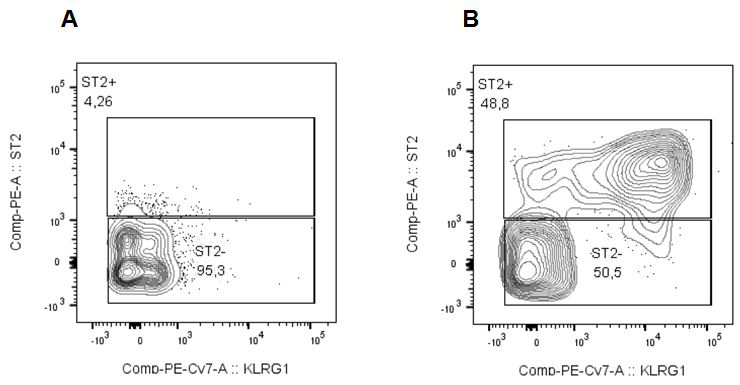 |
UNIQUE HpARI - Suppressor of Type 2 (Allergic) Immune Response
AdipoGen Life Sciences' HpARI (Alarmin Release Inhibitor) (rec.) (His) (Prod. No. AG-40B-0178) and HpARI (CCP1/2) (rec.) (Prod. No. AG-40B-0201) (His) are recombinantly produced proteins.
HpARI is a protein normally secreted by the mouse parasite Heligmosomoides polygyrus. The mature protein HpARI, containing three predicted Complement Control Protein (CCP)-like modules (also known as Short Consensus Repeats (SCRs) or sushi-domains), suppresses type 2 (allergic) immune responses through interference in the interleukin-33 (IL-33) pathway. During cell damage, HpARI gains access to the nucleus of necrotic cells, where it binds directly to IL-33 and nuclear DNA, preventing secretion and binding of IL-33 to its receptor. A non-natural truncation consisting of the first 2 domains of HpARI (CCP1/2) retains IL-33 and DNA binding capacity. HpARI (CCP1/2) is able to stabilize IL-33, increasing its half-life and amplifying its effects. HpARI (CCP1/2) increases IL-33 activity by protecting it from oxidation and proteolytic degradation. HpARI (CCP1/2) (rec.) (His) is a new type of reagent to study IL-33-mediated pathology in vivo.HpARI is a new type of reagent to prevent IL-33-mediated pathology.
LIT: HpARI protein secreted by a helminth parasite suppresses interleukin-33: M. Osbourne, et al.; Immunity 47, 739 (2017) | A Truncated Form of HpARI Stabilizes IL-33, Amplifying Responses to the Cytokine: C. Chauche, et al.; Front. Immunol. 11, 1363 (2020)
|
Figure: Binding of HpARI (CCP1/2) (rec.) (His) (Prod. No. AG-40B-0201) to human and mouse IL-33. Method: IL-33 (human) (rec.) (untagged) (Prod. No. AG-40B-0038), IL-33 (mouse) (rec.) (untagged) (Prod. No. AG-40B-0041) as well as an unrelated protein as control are coated on an ELISA plate at 1µg/ml. After blocking and washing steps, indicated concentrations of HpARI (CCP1/2) (rec.) (His) is added. Following incubation for 1h at RT, the binding is detected using an anti-His antibody (HRP). |
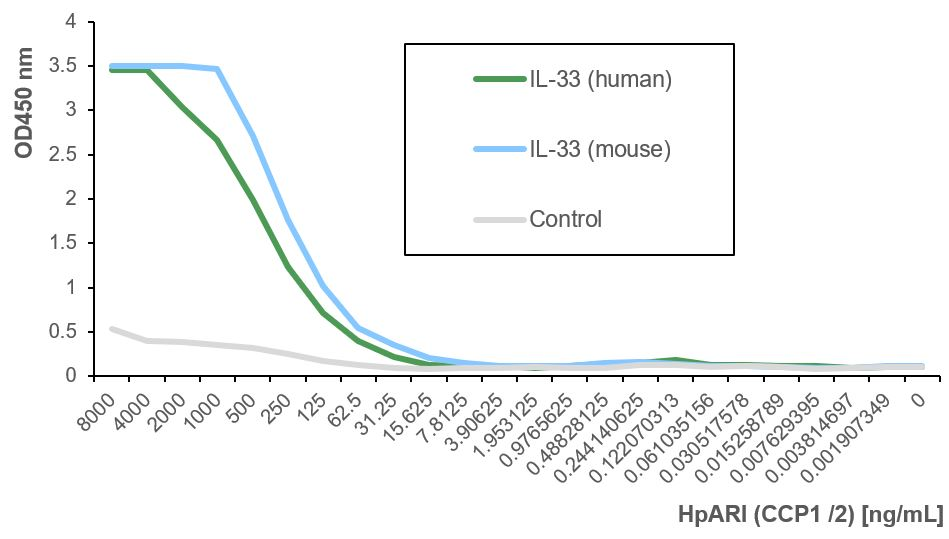 |
POTENT ST2-specific Antibody for Flow Cytometry
AdipoGen Life Sciences' anti-ST2 (human), pAb (Prod. No. AG-25A-0058) is a polyclonal antibody that recognizes solube human ST2 in Western blot and Flow Cytometry. Soluble ST2 plays a role in protecting ILC2 from IL-33 stimulation and thereby maintaining them in a naïve state and it might be important for the regulation of several disease. This antibody is available unlabeled and as labeled versions with ATTO 448 (Prod. No. AG-25A-0058YTD) and ATTO 647N (Prod. No. AG-25A-0058YTS).
|
Figure: Detection of endogenous human ST2 with anti-ST2 (human), pAb (ATTO 488) (AG-25A-0058YTD). Method: Total PBMCs (Peripheral Blood Mononuclear Cells) were stained with anti-ST2 (human), pAb (ATTO 488) (1:100 in PBS + 2% FCS) (Figure B) or with no antibody (Figure A) for 1h at 4°C. The staining was analyzed by flow cytometry. |
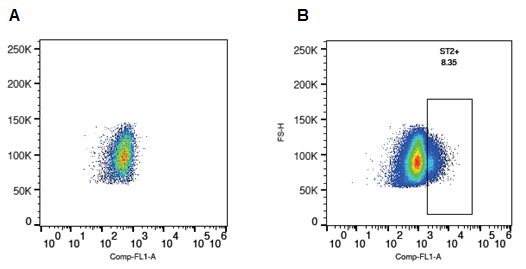 |
All Recombinant IL-33 Proteins & Related Proteins
| Product Name | PID | Product Description |
| HpARI (Alarmin Release Inhibitor) (rec.) (His) | AG-40B-0178 |
Binds to human and mouse IL-33. |
| HpARI (CCP1/2) (rec.) (His) | AG-40B-0201 |
Binds to human and mouse IL-33. |
| IL-33 (oxidation resistant) (human) (monomeric):Fc-KIH (human) (rec.) | AG-40B-0233 |
Activation in vivo of Innate Lymphoid Cells 2 (ILC2) |
| IL-33 (oxidation resistant) (human) (rec.) (His) | AG-40B-0167 |
Activation in vivo of Innate Lymphoid Cells 2 (ILC2) |
| IL-33 (oxidation resistant) (human) (rec.) (untagged) | AG-40B-0160 |
Activation in vivo of Innate Lymphoid Cells 2 (ILC2) |
| IL-33 (human) (rec.) (untagged) | AG-40B-0038 |
Activates human and mouse ST2-dependent NF-κB pathway. |
| IL-33 (human) (rec.) (His) | AG-40A-0042 |
Activates human ST2-dependent NF-κB pathway. |
| IL-33 (mouse) (rec.) (untagged) | AG-40B-0041 |
Activates mouse and human ST2-dependent NF-κB pathway. |
| IL-33 (mouse) (rec.) (His) | AG-40A-0053 |
Activates mouse and human ST2-dependent NF-κB pathway. |
| ST2 (human):Fc (human) (rec.) | AG-40A-0059 |
Interacts with human IL-33. |
| IL-33R [ST2] (human):Fc (human) (rec.) | CHI-HF-21033R | Measured by its ability to bind recombinant human IL-33 in a functional ELISA. |
| IL-33R [ST2] (mouse):Fc (mouse) (rec.) | CHI-MF-11033R | Measured by its ability to bind recombinant mouse IL-33 in a functional ELISA. |
All IL-33 Related Antibodies
| Product Name | PID | Product Description |
| anti-IL-33, mAb (IL33026B) | AG-20A-0043 | Recognizes human and mouse IL-33 in Immunoprecipitation and Western blot. |
| anti-IL-33, mAb (IL33068A) | AG-20A-0042 | Recognizes human IL-33 in Western blot. |
| anti-IL-33 (mouse), mAb (rec.) (blocking) (Bondy-1-1) | AG-27B-0013 | Recognizes mouse IL-33 in ELISA and Functional Application (Blocking). |
| anti-IL-33 (mouse), mAb (rec.) (blocking) (Bondy-1-1) (preservative free) | AG-27B-0013PF | Recognizes mouse IL-33 in ELISA and Functional Application (Blocking). |
| anti-IL-33 (human), mAb (IL33305B) | AG-20A-0041 | Recognizes human IL-33 in Functional, Immunohistochemistry, Immunoprecipitation and Western blot. |
| anti-IL-33 (human), pAb | AG-25A-0045 | Recognizes recombinant human IL-33 in Immunohistochemistry and Western blot. |
| anti-IL-33 (mouse), pAb | AG-25A-0047 |
Recognizes mouse IL-33 in Western blot. |
| anti-IL-33 (mouse), mAb (rec.) (Carly-1-4) | AG-27B-0012 |
Recognizes mouse IL-33 in Western blot. |
| anti-ST2 (human), mAb (ST33868) | AG-20A-0044 |
Recognizes human ST2 in Immunohistochemistry and Western blot. |
| anti-ST2 (human), pAb | AG-25A-0058 |
Recognizes soluble human ST2 in ELISA, Flow Cytometry and Western blot. |
| anti-ST2 (human), pAb (ATTO 488) | AG-25A-0058TD |
Recognizes soluble human ST2 in ELISA, Flow Cytometry and Western blot. |
| anti-ST2 (human), pAb (ATTO 647N) | AG-25A-0058TS |
Recognizes soluble human ST2 in ELISA, Flow Cytometry and Western blot. |
|
More Information |
|
Downloadable Flyer |
|
Interleukin-33 - Insights AdipoGen Life Sciences offers a broad range of unique research tools for IL-33 research. IL-33 is a potent inducer of type 2 immune responses.
|

